Dubai's RTA Launches Taxi-Sharing Pilot Between Dubai And Abu Dhabi

Dubai's Roads and Transport Authority (RTA) started a new taxi-sharing pilot service, allowing passengers to share rides between Ibn Battuta Centre in Dubai and Al Wahda Centre in Abu Dhabi.
The goal of this service is to offer a quick, easy and affordable way to travel. This pilot will run for six months and based on its success, it may be expanded to other locations in the future.
Adel Shakri, Director of Planning and Business Development at the Public Transport Agency of Dubai's Roads and Transport Authority, said, "Ibn Battuta Centre in Dubai and Al Wahda Centre in Abu Dhabi were selected after a thorough analysis of potential routes for the shared taxi service between the two emirates," WAM reported.
"This initiative aims to reduce travel costs, particularly for frequent commuters between Dubai and Abu Dhabi. Furthermore, both locations are well-connected to public transportation hubs and parking facilities," Shakri added.
The initiative will mainly benefit passengers by lowering costs by up to 75% when four people share one taxi between the two emirates. In this case, each passenger would only pay AED 66, sharing the fare instead of having one person pay the full amount, Shakri said.
Passengers can pay their fares using bank cards or NOL cards. It's important to know that the fare will be AED 132 per passenger when two people share a taxi and AED 88 when three passengers travel together.
With this initiative, the RTA aims to reduce traffic congestion by encouraging shared rides in a single taxi, which will help the environment by lowering carbon emissions and decreasing unlicensed transportation services.
Furthermore, passengers can expect safe, smooth, and comfortable rides in RTA taxis, which come with safety features like cameras linked to the Operations Control Centre and systems to monitor driver performance.
In September, RTA launched the trial operation of the world's first electric abra using 3D printing technology in partnership with the private sector. The abra, which can hold 20 passengers, has been designed to keep the traditional look.
This project is part of the government's plan to use 3D printing more, aimed at cutting the time to make abras by 90%, reducing manufacturing costs by 30%, and lowering operation and maintenance expenses by 30%.
© Copyright 2023 IBTimes AE. All rights reserved.





















